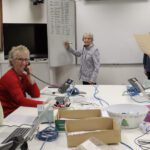Two Curtin University-led research projects that aim to improve Australia’s defence and national security capabilities have been awarded funding in the latest round of The Defence Science Centre (DSC) Collaborative Research Grants.
Announced today by the Minister for Defence Industry, the Hon Melissa Price MP and WA Defence Minister Paul Papalia, the projects have been awarded a combined total of $291,560 and will be led by Professors Ba-Ngu Vo and Ba-Tuong Vo from Curtin’s School of Electrical Engineering, Computing and Mathematical Sciences and Associate Professor Randall Wayth from the Curtin University node of the International Centre for Radio Astronomy Research (a State Government funded Joint Venture between Curtin University and The University of Western Australia).
The successful projects include research to develop technology that can detect early threats and suspicious activities over large areas of land and sea, and a project which will use radio astronomy technologies, based on the Murchison Widefield Array, to monitor and track space-based objects and satellites.
Curtin University Vice-Chancellor Professor John Cordery congratulated the recipients on receiving funding in the latest round of grants, which continues to expand on Curtin University’s reputation as a leader in the Space sector.
“Professors Vo will work closely with Perth satellite start-up LatConnect 60 to develop the technology, in collaboration with the Land Division of DST Group, which will be essential in ground and maritime surveillance over large areas, allowing for optimal, informed and timely decision-making by authorities,” Professor Cordery said.
“Associate Professor Wayth’s work will take an important step in demonstrating that radio astronomy technology and techniques can be implemented in a flexible and deployable system to support the modern Defence force, demonstrating the translation of radio astronomy into other high impact sectors.
“Both projects are further developing Curtin’s existing strengths in the domain of space situational awareness for the benefit of defence and the growing space industry. The success of these two projects demonstrate how high-quality research can have real-world applications for Australia’s defence and national security sector.”
The two projects are collaborative with other WA universities, including researchers from Edith Cowan University and The University of Western Australia, and include support from industry partners.
Further information on the DSC Research Grants can be found online here.



